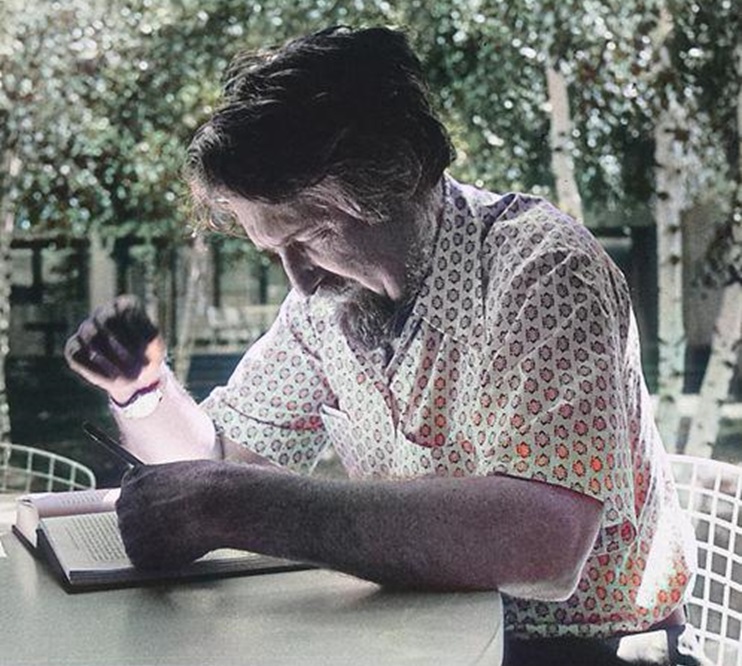Clifford Geertz
[1926-2006]
Clifford Geertz was an American cultural anthropologist and the first and founding professor in the School of Social Science.
As an anthropologist, is Clifford Geertz' career path as smooth as people thought ? Get to know more about George's life in the article below.
I. Clifford Geertz biography
American cultural anthropologist Clifford James Geertz (August 23, 1926 – October 30, 2006) is renowned for his research on cultural symbols and meaning. He spent thirty years at Princeton University studying Southeast Asian and North African cultures, looking into a wide range of social structures like political development, family life, and religion. His focus has been on the symbolism that reveals the worldviews that each culture has of the universe. His work has made a significant contribution to our understanding of how different cultures have perceived the world of physical reality on the outside.

1. Who is Clifford Geertz?
Clifford Geertz was born in San Francisco, California in 1926. He wanted to be a journalist and a writer, and he served as editor of the high school newspaper. However, he made the decision to enlist in the U.S. Navy when World War II began. After serving in the military (1943–1955), he desired to leave California, "where I lacked a family but had an abundance of relatives. I aspired to literary fame as a novelist. Most fortunately, I also had the GI Bill " (Geertz 1999). Clifford Geertz enrolled at Antioch College in Ohio on the advice of his former English teacher from high school, where he graduated in 1950 with an A.B. in philosophy. He soon got married and, along with his wife, was accepted to study anthropology at Harvard University, earning his Ph.D. in 1956.
2. Clifford Geertz early career
Clifford Geertz developed a reputation as a "champion of symbolic anthropology" at the University of Chicago, which places a strong emphasis on the function of symbols in society. Clifford Geertz defined culture as "a system of inherited conceptions expressed in symbolic forms by means of which people communicate, perpetuate, and develop their knowledge about and attitudes toward life" in his well-known book The Interpretation of Cultures (1973). In order to impose meaning and make the world understandable, culture serves this purpose.
Thus, it is anthropologists' responsibility to make every effort to interpret the important symbols of each culture. The anthropologist must sort out issues similar to those a literary critic would when examining a text "the underlying social foundations and significance of the significant structures... Making an ethnographic study is similar to attempting to read a manuscript".
Clifford Geertz made contributions to social and cultural theory and continues to have an impact on anthropology by encouraging it to focus on the frames of meaning that different peoples use to interpret the world. He gave some thought to the fundamental principles of anthropology, including culture and ethnography.
3. Clifford Geertz Influences
Anthropologist Sherry Ortner summarizes Geertz's influence in the introduction to The Fate of 'Culture': Clifford Geertz and Beyond: Clifford Geertz is a key player in the redrawing of the line dividing the social sciences from the humanities in the latter half of the 20th century. Clifford Geertz revived and transformed the anthropological concept of culture in a way that made clear its relevance to a variety of humanistic disciplines, drawing on his own background in philosophy and literary studies.
He also created a significant alternative to the then-dominant scientism of the social sciences by insisting that human social life is a matter of meaningful activity that can only be very imperfectly studied through the objectifying methods of science. This alternative is still gaining ground in almost every field of social science today. Geertz's work ultimately had the effect of radically repositioning the field of anthropology itself, moving it from a somewhat exotic and specialized corner of science to one that offers the social sciences a powerful alternative to the seemingly irresistible juggernaut of science.
II. Clifford Geertz Social Science Explain
Geertz has theoretical works and descriptive ethnographic works. His two famous theoretical treatises: Deep Description: Towards an Interpretive Theory of Culture and Religion as a System cultural system. The first treatises interpretive anthropology in general terms and the second deals directly with the question of religion. Here are a few examples of how Clifford Geertz applied this approach to some of his religious studies.

When it comes to meaning, everyone thinks what is private, is an idea in the individual's head. But in fact, meaning is not necessarily only private, but all meanings are in the inter-subject relationship. Individuals cannot "wink (to someone)" (wink) alone, but must be done in a social relationship, with others. And so, the culture of any society is a context of shared and therefore objective meanings. This is what anthropologists try to reproduce when studying a community of people regardless of time and space.
But it must be known that culture consists not only of meaning, not only a system of symbols, but also of social action to be observed, "for it is through the flow of acts - or precisely rather, social action—with which cultural forms find articulations” . This means that, in some cases, the anthropologist's description of culture is not always appropriate. Sometimes people behave contrary to their own culture's meaning systems, or cultural systems offer diverse, opposing patterns. And the anthropologist can only reconstruct what the subject thinks and write down the best interpretation of what is observed. For the interpretive anthropologist, cultural analysis has always been a matter of "guessing meanings, evaluating conjectures, and drawing explanatory conclusions".
The above difficulty can only be done in a small-scale context, such as in a tribe, a village community that the cultural system can draw in detail. Thus, for Clifford Geertz, any attempt to arrive at broad, universal arguments about man is questionable. Clifford Geertz shows the limits of case studies, or "test cases," such as Durkheim's Totemism. It is not possible to study two cultures in a comparative way in the laboratory (including the control group and the experimental group). According to him, the general theories for interpreting culture are gone because cultural analysis "is not an empirical science in search of rules but an interpretive science in search of meaning".
So, doesn't cultural interpretation give us anything of general value? Not entirely so. Clifford Geertz thinks we also learn something from that, like how a doctor's pulse is used to identify a disease from its symptoms. Anthropology cannot predict with certainty as in the physical or chemical sciences, but as diagnostic, a theory must to some extent predict what will happen elsewhere or in some way. That may apply to other cases. When interpreting a culture, a theory should try to "try" with another culture to be defended, partially used, or discarded. In that intention, the anthropologist has a series of abstractions such as “structure”, “ritual”, “identity”, “integration”… These concepts help to compare cases.
III. Clifford Geertz The Interpretation of Cultures
If Interpretive Anthropology is to find meaning and value systems in people's lives, it is essential to focus on religion in any culture. And Clifford Geertz demonstrated this in his first field work: Religion in Java (1960). Through this work, he describes in detail the intersection of religious traditions: Islam, Hinduism and indigenous animist beliefs. He viewed religion as a cultural event rather than merely an expression of social needs and economic tensions. Through his study of symbols, ideas, customs, and rituals, he showed that religion influenced all the Javanese by a hair's breadth.
Culture is what he describes as “meaningful patterns” or ideas conveyed in symbols, through which people impart knowledge about life and express their attitudes towards it. However, within a culture, there are many attitudes, there are many different forms of knowledge that are passed on, so there are also different "cultural systems" to convey them. We can name a number of cultural systems such as art, religion, "common sense", political ideology, etc.
Clifford Geertz considers religion as a cultural system by definition with a proposition that includes the following clear points: Religion is “(1) a symbolic system, which works to (2) establish minds powerful, pervasive, and enduring state and motives in man by (3) propounding concepts of a general order of existence and (4) dressing these concepts with an aura of really makes (5) those moods and motives seem to be the only reality.”

IV. Clifford Geertz Death & Legacy
Geertz died at the age of 80 early yesterday morning of complications following heart surgery at the Hospital of the University of Pennsylvania.
Not only did Clifford Geertz encourage others to criticize and expand upon his theories, he also left remnants of his essence out in the world. His influence can be seen in unexpected places, like the San Francisco company Thick House, which performs experimental theater. As the ensemble strives to involve racially and culturally diverse audiences through their performances, Geertz's dense description is highlighted.
The title of one of Geertz's most revolutionary works, "Thick Description," is a direct reference to them. Another global bank that was influenced by Clifford Geertz and, as a result, advertises the value of "local knowledge" does the same thing he did in his article.
Clifford Geertz was honored in May 2000 in Sefrou, Morocco, at a conference titled "Cultures, Sociétiés, et Territoires: Hommage à Clifford Geertz." Because "anthropologists are not always welcomed back to the site of their field studies," Geertz noted that it was especially satisfying.
IV. Clifford Geertz Quotes
“Man is an animal suspended in webs of significance he himself has spun.”
--------
“Cultural analysis is intrinsically incomplete. And, worse than that, the more deeply it goes the less complete it is.”
--------
“There is an Indian story -- at least I heard it as an Indian story -- about an Englishman who, having been told that the world rested on a platform which rested on the back of an elephant which rested in turn on the back of a turtle, asked (perhaps he was an ethnographer; it is the way they behave), what did the turtle rest on? Another turtle. And that turtle? 'Ah, Sahib, after that it is turtles all the way down”
--------
“A religion is a system of symbols which acts to establish powerful, pervasive, and long-lasting moods in men by formulating conceptions of a general order of existence and clothing those conceptions with such an aura of factuality that the moods and motivations seem uniquely realistic.”
“One of the most significant facts about humanity may finally be that we all begin with the natural equipment to a live a thousand kinds of life but end in the end having lived only one”
--------
“It may be in the cultural particularities of people — in their oddities — that some of the most instructive revelations of what it is to be genetically human are to be found.”
--------
“What we call our data are really our own constructions of other people’s constructions of what they and their compatriots are up to.”
--------
“Understanding a people's culture exposes their normalness without reducing their particularity...It renders them accessible: setting them in the frame of their own banalities, it dissolves their opacity.”
--------
“If we wanted home truths, we should have stayed at home.”
--------
“What the ethnographer is in fact faced with—except when (as, of course, he must do) he is pursuing the more automatized routines of data collection—is a multiplicity of complex conceptual structures, many of them superimposed upon or knotted into one another, which are at once strange, irregular, and inexplicit, and which he must contrive somehow first to grasp and then to render. And this is true at the most down-to-earth, jungle field work levels of his activity; interviewing informants, observing rituals, eliciting kin terms, tracing property lines, censusing households … writing his journal. Doing ethnography is like trying to read (in the sense of “construct a reading of”) a manuscript—foreign, faded, full of ellipses, incoherencies, suspicious emendations, and tendentious commentaries, but written not in conventionalized graphs of sound but in transient examples of shaped behavior.”
--- Clifford Geertz
WHAT IS YOUR IQ?
This IQ Test will help you test your IQ accurately
Maybe you are interested
